LITERATUR – BÜCHER & STUDIEN
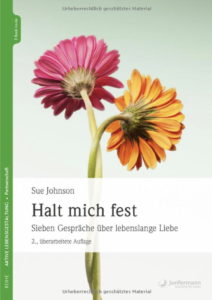
HALT MICH FEST
SIEBEN GESPRÄCHE ZU EINEM VON LIEBE ERFÜLLTEN LEBEN. SUSAN M. JOHNSON. EMOTIONSFOKUSSIERTE THERAPIE IN DER PRAXIS. JUNGFERNMANN-VERLAG, PADERBORN, 2019.
Klappentext
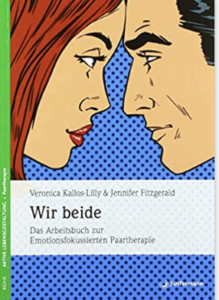
Klappentext
Veronica Kallos-Lilly und Jennifer Fitzgerald stellen in diesem Arbeitsbuch das Prinzip der EFT vor und zeigen Möglichkeiten auf, wie Paare mit ihr arbeiten können. Es werden verschiedene Faktoren einer Beziehung erläutert. Dazu gibt es Übungen und Fragebögen sowie Praxisbeispiele, um schnell und effektiv die Brücke zum eigenen (Liebes-)Alltag zu schlagen.“
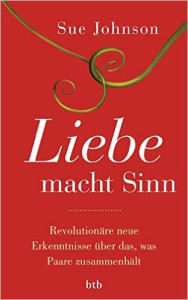
Klappentext
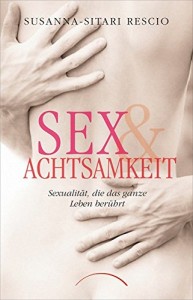
Klappentext
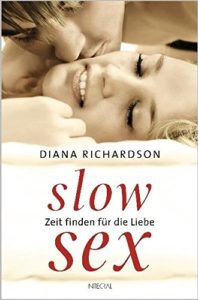
Klappentext
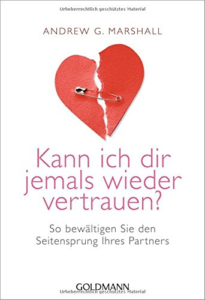
Klappentext
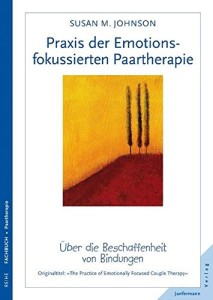
Klappentext
STUDIEN • WISSENSCHAFTLICHE ARTIKEL
OUTCOME RESEARCH
1. Tapia-Fuselier, J. L., Ray, D. C., Allan, R., & Reyes, A. G. (2022). “Emotionally focused therapists’ experiences serving interabled couples in couple therapy: An interpretative phenomenological analysis.” Journal of Marital and Family Therapy, advance online publication.
2. Koren, R., Woolley, S.R., Danis, I., & Török, S. (2022). “Training Therapists in Emotionally Focused Therapy: A longitudinal and cross-sectional analysis.” Journal of Marital and Family Therapy, advance online publication.
3. Schafer, L., Edwards, C. P., Allan, R., Johnson, S. M., Wiebe, S. A., Chyurlia, L., & Tasca, G. A. (2021). “Development of the Emotionally Focused Individual Therapy Adherence Measure (EFIT-AM): Conceptualization and preliminary reliability.” Counselling and Psychotherapy Research, Advance online publication.
4. Ganz, M. B., Rasmussen, H. F., McDougall, T. V., Corner, G. W., Black, T. T., & De Los Santos, H. F. (2021). “Emotionally focused couple therapy within VA healthcare: Reductions in relationship distress, PTSD, and depressive symptoms as a function of attachment-based couple treatment.” Couple and Family Psychology: Research and Practice, 11(1), 15-32.
5. Kailanko, S., Wiebe, S. A., Tasca, G. A., & Laitila, A. A. (2021). “Impact of repeating somatic cues on the depth of experiencing for withdrawers and pursuers in emotionally focused couple therapy.” Journal of Marital and Family Therapy, 00, 1– 16.
6. Ceniza, M., & Allan, R. (2021). “Conceptual and Application Considerations of Emotionally Focused Therapy with White Heterosexual Working-Class Rural Males.” The Family Journal, 29(2), 200-207.
7. Koren, R., Woolley, S. R., Danis, I., & Török, S. (2021). “Measuring the Effectiveness of the Emotionally Focused Therapy Externship Training in Hungary done through Translation.” Journal of Marital and Family Therapy, 47(1), 166-182.
8. Rodríguez-González, M., Schweer-Collins, M., Greenman, P.G., Lafontaine, M.-F., Fatás, M., & Sandberg, J.G. (2019). “Short-Term and Long-Term Effects of Training in EFT: A Multi-National Study in Spanish-speaking Countries.” Journal of Marital and Family Therapy, 46(2), 304-320.
9. Beasley, C.C., & Ager, R. (2019). “Emotionally Focused Couples Therapy: A Systematic Review of its Effectiveness Over the past 19 Years.” Journal of Evidence-Based Social Work, 16(2), 144-159.
10. Wiebe, S.A., Elliott, C., Johnson, S.M., Burgess Moser, M., Dalgleish, T.L., Lafontaine, M-F., & Tasca, G.A. (2019). “Attachment Change in Emotionally Focused Couple Therapy and Sexual Satisfaction Outcomes in a Two-year Follow-up Study.” Journal of Couple and Relationship Therapy, 18(1), 1-21.
11. Alder, M.C., Dyer, W.J., Sandberg, J.G., Davis, S.Y., & Holt-Lunstad, J. (2018). “Emotionally-focused therapy and treatment as usual comparison groups in decreasing depression: A clinical pilot study.” The American Journal of Family Therapy, 46(5), 541-555.
12. Wittenborn, A.K., Liu, T., Ridenour, T.A., Lachmar, E.M., Rouleau, E., & Seedall, R.B. (2018). “Randomized controlled trial of emotionally focused couple therapy compared to treatment as usual for depression: Outcomes and mechanisms of change.” Journal of Marital and Family Therapy, 45, 395-409.
13. Weissman, N., Batten, S.V., Rheem, K.D., Wiebe, S.A., Pasillas, R.M., Potts, W., Barone, M., Brown, C.H., & Dixon, L.B. (2017). “The Effectiveness of Emotionally Focused Couples Therapy With Veterans With PTSD: A Pilot Study.” Journal of Couple & Relationship Therapy, 17(1), 25-41.
14. Lee, N.A., Furrow, J.L., & Bradley, B.A. (2017). “Emotionally Focused Couple Therapy for Parents Raising a Child with an Autism Spectrum Disorder: A pilot study.” Journal of Marital and Family Therapy, 43(4), 662-673.
15. Wiebe, S., Johnson, S. M., Burgess-Moser, M., Dalgleish, T., Lafontaine, M., & Tasca, G. (2017). “Predicting follow-up outcomes in Emotionally Focused Couple Therapy: The role of change in trust, relationship-specific attachment, and emotional engagement.” Journal of Marital and Family Therapy, 43(2), 213-226.
16. Wiebe, S., Johnson, S. M., Burgess-Moser, M., Dalgleish, T., Lafontaine, M., & Tasca, G. (2016). “Two-year follow-up outcomes in Emotionally Focused Couple Therapy: An investigation of relationship satisfaction and attachment trajectories.” Journal of Marital and Family Therapy, 43(2), 227-244.
17. Burgess-Moser, M., Johnson, S. M., Dalgleish, T., Lafontaine, M., Wiebe, S., & Tasca, G. (2015). “Changes in relationship-specific attachment in Emotionally Focused Couple Therapy.” Journal of Marital and Family Therapy, 42(2), 231-245.
18. Dalgleish, T.L., Johnson, S.M., Burgess Moser, M., Lafontaine, M. F., Wiebe, S.A. & Tasca, G.A. (2015). “Predicting change in marital satisfaction throughout Emotionally Focused Couple Therapy.” Journal of Marital and Family Therapy, 41(3), 276-291.
19. Johnson, S.M., Burgess Moser, M., Beckes, L., Smith, A., Dalgleish, T., Halchuk, R., Hasselmo, K., Greenman, P.S., Merali, Z. & Coan, J.A. (2013). “Soothing the threatened brain: Leveraging contact comfort with Emotionally Focused Therapy.” PLOS ONE, 8(11): e79314.
20. Dalton, J., Greeman, P., Classen, C., & Johnson, S. M. (2013). “Nurturing Connections in the Aftermath of Childhood Trauma: A randomized controlled trial of Emotionally Focused Couple Therapy (EFT) for Female Survivors of Childhood Abuse.” Couple and Family Psychology: Research and Practice, 2(3), 209-221.
21. McLean, L.M., Walton, T., Rodin, G., Esplen, M.J., & Jones, J.M. (2013). “A couple-based intervention for patients and caregivers facing end-stage cancer: outcomes of a randomized controlled trial.” Psycho-Oncology, 22(1), 28-38.
22. Denton, W.H., Wittenborn, A.K., & Golden, R.N. (2012). “Augmenting antidepressant medication treatment of depressed women with emotionally focused therapy for couples: A randomized pilot study.” Journal of Marital and Family Therapy, Vol.38, Supplement s1, 23-38.
23. Halchuk, R., Makinen, J. & Johnson, S. M. (2010). “Resolving Attachment Injuries in Couples using Emotionally Focused Therapy: A 3-year follow-up.” Journal of Couple and Relationship Therapy, 9, 31- 47.
24. Honarparvaran, N., Tabrizy, M., & Navabinejad, Sh. (2010). “The efficacy of emotionally focused couple therapy (EFT-C) training with regard to reducing sexual dissatisfaction among couples.” European Journal of Scientific Research, 43(4), 538-545.
25. MacIntosh, H.B. & Johnson, S. (2008). “Emotionally focused therapy for couples and childhood sexual abuse survivors.” Journal of Marital and Family Therapy, 34(3), 298-315.
26. Naaman, S., Johnson, S.M., & Radwan, K. (2008). “Evaluation of the clinical efficacy of emotionally focused therapy on psychological adjustment of couples facing early breast cancer,” (Doctoral Dissertation). School of Clinical Psychology, University of Ottawa, Canada.
27. Couture-Lalande, M.-E., Greenman, P.S., Naaman, S. & Johnson, S.M. (2007). “La thérapie de couple axée sur l’émotion (EFT) pour traiter les couples dont la femme a le cancer du sein: Une étude exploratoire / Emotionally focused therapy (EFT) for couples with a female partner who suffers from breast cancer: an exploratory study.” Psycho-Oncology, 1(4), 257–264. (Journal of the Psychological, Social and Behavioral Dimensions of Cancer).
28. Makinen, J. A. & Johnson, S. (2006). “Resolving Attachment Injuries in Couples using EFT: Steps Toward Forgiveness and Reconciliation.” Journal of Consulting and Clinical Psychology, 74(6), 1055-1064.
29. Dessaulles, A., Johnson, S.M. & Denton, W. (2003). “Emotion-Focused Therapy for Couples in the Treatment of Depression: A Pilot Study.” American Journal of Family Therapy, 31(5), 345-353.
30. Clothier, P., Manion, I., Gordon-Walker, J. & Johnson, S.M. (2002). “Emotionally Focused Interventions for Couples with Chronically Ill Children: A two year follow-up.” Journal of Marital and Family Therapy, 28(4), 391-398.
31. Denton, W., Burleson, B., Clark, T., Rodriguez, C. & Hobbs, B. (2000). “A Randomized Trial of Emotionally Focused Therapy for Couples in a Training Clinic.” Journal of Marital and Family Therapy, 26(1), 65-78.
32. Johnson, S., Hunsley, J., Greenberg, L. & Schindler, D. (1999). “Emotionally Focused Couples Therapy: Status & challenges (A meta-analysis).” Journal of Clinical Psychology: Science and Practice, 6(1), 67- 79. NOTE: Also listed here under “Meta-Analyses”
33. Johnson, S., Maddeaux, C. & Blouin, J. (1998). “Emotionally Focused Family Therapy for Bulimia: Changing Attachment Patterns.” Psychotherapy: Theory, Research & Practice, 35(2), 238-247.
34. Gordon-Walker, J., Johnson, S., Manion, I. & Cloutier, P. (1996). “Emotionally Focused Marital Intervention for Couples with Chronically Ill Children.” Journal of Consulting and Clinical Psychology, 64(5), 1029-1036.
35. McPhee, D., Johnson, S.M. & van der Veer, M.C. (1995). “Low sexual desire in women: The effects of marital therapy.” Journal of Sex and Marital Therapy, 21(3), 159-182.
36. Dandeneau, M. & Johnson, S. (1994). “Facilitating Intimacy: Interventions and Effects.” Journal of Marital and Family Therapy, 20(1), 17-33.
37. Goldman, A. & Greenberg, L. (1992). “Comparison of Integrated Systemic and Emotionally Focused Approaches to Couples Therapy.” Journal of Consulting and Clinical Psychology, 60(6), 962-969.
38. James, P. (1991). “Effects of a Communication Training Component Added to an Emotionally Focused Couples Therapy.” Journal of Marital and Family Therapy, 17(3), 263-275.
39. Johnson, S. & Greenberg, L. (1985). “Emotionally Focused Couples Therapy: An Outcome Study.” Journal of Marital and Family Therapy, 11(3), 313-317.
40. Johnson, S. & Greenberg, L. (1985). “The Differential Effects of Experiential and Problem Solving Interventions in Resolving Marital Conflict.” Journal of Consulting & Clinical Psychology, 53, 175-184. (EFT, CBT and controls tested.)
Iranian Articles:
41. Motaharinasab, A., Zare Bahramabadi, M. & Ahmadi, K. (2016). “The Effect of Emotionally Focused Therapy on Emotional Expression Styles Among Married Women.” International Journal of Mental Health and Addiction, 2016, 14(4), 505-513.
42. Soleimani, A.A., Najafi, M., Ahmadi, Kh., Javidi, N., Hoseini Kamkar, E., & Mahboubi, M. (2015). “The effectiveness of emotionally focused couples therapy on sexual satisfaction and marital adjustment of infertile couples with marital conflicts.” International Journal of Fertility and Sterility, 9(3), 393-402.
43. Mehr, S.E., Bahrami, F., Karami, B., Mehr, Y.E., Hedayati, A.M., Ahmadi, S. & Rozeyan, A. (2014) “Studying the effect of emotion focused therapy on couples’ attachment styles.” MAGNT Research Report, Vol.2(5), 595-602.
44. Ahmadi, F.S., Zarei, E. & Fallahchai, S.R. (2014). “The Effectiveness of Emotionally-Focused Couple Therapy in Resolution of Marital Conflicts between the Couples Who Visited the Consultation Centers.” Journal of Education and Management Studies, 4(1), 118-123.
45. Soltani, M., Shairi, M.R., Roshan, R., & Rahimi, C. (2014). “The Impact of Emotionally Focused Therapy on Emotional Distress in Infertile Couples.” International Journal of Fertility and Sterility, 7(4): 337-344.
46. Soltani, M., Molazadeh, J., Mahmoodi, M., & Hosseini, S. (2013). “A Study on the effectiveness of Emotionally Focused Couple Therapy on Intimacy of Couples.” Social and Behavioral Sciences, Vol.82, 461-465.
Relevante Literaturhinweise zur Emotionsfokussierten Paartherapie finden Sie auch bei
PROCESS & PREDICTORS RESEARCH
47. Myung, H. S., Furrow, J. L., & Lee, N. A. (2022). “Understanding the emotional landscape in the withdrawer re‐engagement and blamer softening EFCT change events.” Journal of Marital and Family Therapy, 1–19.48. Welch, T. S., Lachmar, E. M., Leija, S. G., Easley, T., Blow, A. J., Wittenborn, A. K. (2019). “Establishing safety in emotionally focused couple therapy: A single-case process study.” Journal of Marital and Family Therapy, 45, 621– 634.4
48. Brubacher, L.L., & Wiebe, S.A. (2019). “Process-research to Practice in Emotionally Focused Couple Therapy: A Map for Reflective Practice.” Journal of Family Psychotherapy, 30(4), 292-313.
49. Burgess Moser, M., Johnson, S.M., Dalgleish, T.L., Wiebe, S.A., & Tasca, G. (2017). “The impact of blamer-softening on romantic attachment in Emotionally Focused Couples Therapy.” Journal of Marital and Family Therapy, 44(4), 640-654.
50. Dalgleish, T.L., Johnson, S. M., Burgess Moser, M., Wiebe, S.A. & Tasca, G.A. (2015). “Predicting Key Change Events in Emotionally Focused Couple Therapy.” Journal of Marital and Family Therapy, 41(3), 260-275.
51. Sandberg, J.G., Brown, A.P., Schade, L.C., Novak, J.R., Denton, W.H. & Holt-Lundstad, J. (2015). “Measuring Fidelity in Emotionally Focused Couples Therapy (EFT): A Pilot Test of the EFT Therapist Fidelity Scale.” The American Journal of Family Therapy, 43(3), 251-268.
52. Schade, L.C., Sandberg, J.G., Bradford, A., Harper, J.M., Holt-Lunstad, J. & Miller, R.B. (2015). “A Longitudinal View of the Association Between Therapist Warmth and Couples’ In-Session Process: An Observational Pilot Study of Emotionally Focused Couples Therapy.” Journal of Marital and Family Therapy, 41(3), 292-307.
53. McRae, T.R., Dalgleish, T.L., Johnson, S.M., Burgess-Moser, M., & Killian, K.D. (2014). “Emotion Regulation and Key Change Events in Emotionally Focused Couple Therapy.” Journal of Couple & Relationship Therapy, 13(1), 1-24.
54. Greenman, P., & Johnson, S. (2013). “Process Research on EFT for Couples: Linking Theory to Practice.” Family Process, Special Issue on Couple Therapy, 52(1), 46-61.
55. Zuccarini, D.J., Johnson, S.M., Dalgleish, T. & Makinen, J. (2013). “Forgiveness and reconciliation in Emotionally Focused Therapy for Couples: The Client Change Process and Therapist Interventions.” Journal of Marriage and Family Therapy, 39(2), 148-162.
56. Swank, L.E. & Wittenborn, A.K. (2013). “Repairing Alliance Ruptures in Emotionally Focused Couple Therapy: A Preliminary Task Analysis.” The American Journal of Family Therapy, 41(5), 389-402.
57. Furrow, J.L., Edwards, S.A., Choi, Y., & Bradley, B. (2012). “Therapist presence in emotionally focused couple therapy blamer softening events: promoting change through emotional experience.” Journal of Marital and Family Therapy, Vol.38, Supplement s1, 39-49.
58. Wittenborn, A.K. (2012). “Exploring the Influence of the Attachment Organizations of Novice Therapists on their Delivery of Emotionally Focused Therapy for Couples.” Journal of Marital and Family Therapy, Vol.38, Supplement s1, 50-62.
59. Denton, W., Johnson, S. & Burleson, B. (2009). “Emotion-Focused Therapy-Therapist Fidelity Scale (EFT-TFS): Conceptual Development and Content Validity.” Journal of Couple and Relationship Therapy, 8(3), 226-246.
60. Bradley, B. & Furrow, J.L. (2004). “Toward a Mini-theory of the Blamer Softening Event: Tracking the Moment-by-Moment Process.” Journal of Marital and Family Therapy, 30(2), 233- 246.
61. Talitman, E. & Johnson, S. (1997). “Predictors of Success in Emotionally Focused Marital Therapy.” Journal of Marital & Family Therapy, 23(2), 135-152. NOTE: It is interesting to note that in this study, couples continued to significantly improve from the end of therapy to follow-up.
62. Greenberg, L.S., Ford, C., Alden, L. & Johnson, S.M. (1993). “In-session change in emotionally focused therapy for couples.” Journal of Consulting and Clinical Psychology, 61(1), 78-84.
63. Johnson, S.M. & Greenberg, L.S. (1988). “Relating Process to Outcome in Marital Therapy.” Journal of Marital and Family Therapy, 14, 175-183.
EFT Relationship Education Program Research
64. Kennedy, N.W., Johnson, S.M., Wiebe, S.A., & Tasca, G.A. (2019). “Conversations for Connection: An Outcome Assessment of the Hold-Me-Tight Relationship-Education Program for Couples, and Recommendations for Improving Future Research Methodology in Relationship Education.” Journal of Marital and Family Therapy, 45(3), 431-446.
65. Morgis, B., Ewing, E., Liu, T., Slaughter-Acey, J., Fisher, K., & Jampol, R. (2019). “A Hold Me Tight Workshop for Couple Attachment and Sexual Intimacy.” Contemporary Family Therapy, 41(4), 1409-1411.
66. Lesch, E., de Bruin, K., & Anderson, C. (2018). “A Pilot Implementation of the Emotionally Focused Couple Therapy Group Psychoeducation Program in a South African Setting.” Journal of Couple & Relationship Therapy, 17(4), 313-337.
67. Conradi, H.J., Dingemanse, P., Noordhof, A., Finkenauer, C., & Kamphuis, J.H. (2017). “Effectiveness of the ‘Hold me Tight’ Relationship Enhancement Program in a Self-referred and a Clinician-referred Sample: An Emotionally Focused Couples Therapy-Based Approach.” Family Process, 57(3), 613-628.
68. Wong, T.Y., Greenman, P.S., & Beaudoin, V. (2017). “‘Hold Me Tight’: The generalizability of an attachment-based group intervention to Chinese Canadian couples.” Journal of Couple & Relationship Therapy — Innovations in Clinical and Educational Interventions, 17(1), 42-60.
.
Relevante Literaturhinweise zur Emotionsfokussierten Paartherapie finden Sie auch bei
REVIEWS OF EFT RESEARCH
69. Doss, B.D., Roddy, M.K., Wiebe, S.A., & Johnson, S.M. (2022). “A review of the research during 2010–2019 on evidence-based treatments for couple relationship distress.” Journal of Marital and Family Therapy, 48, 283– 306.
70. Wiebe, S.A., & Johnson, S.M. (2016). “A Review of the Research in Emotionally Focused Therapy for Couples.” Family Process, 55(3), 390-407.
71. Johnson, S. and Greenman, P. (2013). “Commentary: Of Course It Is All About Attachment!” Journal of Marital and Family Therapy, 39(4), 421-423.
72. Priest, Jacob B. (2013). “Emotionally Focused Therapy as Treatment for Couples with Generalized Anxiety Disorder and Relationship Distress.” Journal of Couple & Relationship Therapy: Innovations in Clinical and Educational Interventions, 12(1), 22-37.
73. Fitzgerald, J., & Thomas, J. (2012). “A report: Couples with medical conditions, attachment theoretical perspectives and evidence for Emotionally-focused Couples Therapy.” Journal of Contemporary Family Therapy, Vol. 34(2), 277-281.
74. Johnson, S.M., & Wittenborn, A.K. (2012). “New research findings on emotionally focused therapy: Introduction to special section.” Journal of Marital and Family Therapy, 38, Supplement s1, 18-22.
75. Lebow, J.L., Chambers, A.L., Christensen, A., & Johnson, S.M. (2012). “Research on the Treatment of Couple Distress.” Journal of Marital and Family Therapy, 38(1), 145-168.
76. Furrow, J.L, & Bradley, B. (2011). “Emotionally Focused Couple Therapy: Making the Case for Effective Couple Therapy.” In J. Furrow, B. Bradley & S. Johnson (Eds.), The Emotionally Focused Casebook, pp. 3-30. New York: Brunner Routledge.
77. Johnson, S.M. (2008). “Couple and family therapy: An attachment perspective.” In J. Cassidy & P. Shaver (Eds.), Handbook of attachment: Theory, research and clinical applications, 2nd Edition, pp. 811-832. New York: Guilford Press.
78. Johnson, S.M. (2007). “The Contribution of Emotionally Focused Couples Therapy.” Special Edition of the Journal of Contemporary Psychology: Humanistic Psychology, 37(1), 47-52.
79. Johnson, S.M. (2007). “A new era for couple therapy: Theory, research and practice in concert.” Journal of Systemic Therapies, 26(4), 5-16.
80. Caldwell, B.E., Woolley, S.R., & Caldwell, C.J. (2007). “Preliminary estimates of cost-effectiveness for marital therapy.” Journal of Marital and Family Therapy, 33(3), 392-405.
81. Johnson, S.M. (2003). “Emotionally focused couples therapy: Empiricism and art.” In T. Sexton, G. Weeks, & M. Robbins (Eds.), Handbook of Family Therapy: The science and practice of working with families and couples, pp. 303-322. New York, NY: Brunner/Routledge.
82. Johnson, S.M. (2003). “The revolution in couples therapy: A practitioner-scientist perspective.” Journal of Marital and Family Therapy, 29(3), 365-385.
83. Johnson, S.M. (2003). “Couples therapy research: Status and directions.” In G.P. Sholevar (Ed.), Textbook of Family and Couples Therapy: Clinical Applications, pp. 797-820. Arlington, VA: American Psychiatric Publishing Inc. (APPI).
84. Johnson, S.M. (2002). “Marital problems.” In D. Sprenkle (Ed.), Effectiveness Research in Marriage and Family Therapy, pp. 163-192. Alexandria, VA.: American Association for Marriage and Family Therapy (AAMFT).
85. Johnson, S.M. & Lebow, J. (2000). “The coming of age of couple therapy: A decade review.” Journal of Marital and Family Therapy, 26(1), 23-38.
86. Baucom, D., Shoham, V., Mueser, K., Daiuto, A. & Stickle, T. (1998). “Empirically Supported Couple and Family Interventions for Marital Distress and Adult Mental Health Problems.” Journal of Consulting & Clinical Psychology, 66(1), 53-88.
87. Johnson, S.M. (1997). “A Critical Review of Marital Therapy Outcome.” The Canadian Journal of Psychiatry, 42(3), 323.
Relevante Literaturhinweise zur Emotionsfokussierten Paartherapie finden Sie auch bei
META-ANALYSIS
88. Wood, N.D., Crane, D.R., Schaalje, G.B., & Law, D.D. (2005). “What works for whom: A meta- analytic review of marital and couples therapy in reference to marital distress.” The American Journal of Family Therapy, 33(4), 273-287. NOTE: Refers to EFT
89. Johnson, S., Hunsley, J., Greenberg, L. & Schindler, D. (1999). “Emotionally Focused Couples Therapy: Status & challenges (A meta-analysis).” Journal of Clinical Psychology: Science and Practice, 6, 67-79. NOTE: Also listed under Outcome Research
90. Dunn, R.T. & Schwebel, A.I. (1995). “Meta-analytic review of marital therapy outcome research.” Journal of Family Psychology, 9(1), 58-68.
Relevante Literaturhinweise zur Emotionsfokussierten Paartherapie finden Sie auch bei
RESEARCH ON EFT TRAINING /
LEARNING EFT
91. Sandberg, J.G., Rodríguez‐González, M., Pereyra, S., Lybbert, R., Perez, L., & Willis, K. (2020). “The Experience of Learning EFT in Spanish-speaking Countries: A Multi-National Replication Study.” Journal of Marital and Family Therapy, 46(2), 256-271.
92. Koren, R., Woolley, S.R., Danis, I., & Török, S. (2020). “Measuring the Effectiveness of the Emotionally Focused Therapy Externship Training in Hungary done through Translation.” Journal of Marital and Family Therapy, 47(1): 166-182.
93. Rodríguez-González, M., Schweer-Collins, M., Greenman, P.G., Lafontaine, M.-F., Fatás, M., & Sandberg, J.G. (2020). “Short-Term and Long-Term Effects of Training in EFT: A Multi-National Study in Spanish-speaking Countries.” Journal of Marital and Family Therapy, 46(2), 304-320.
94. Sandberg, J.G., Knestel, A., & Cluff Schade, L. (2013). “From Head to Heart: A Report on Clinicians’ Perceptions of the Impact of Learning Emotionally Focused Couple Therapy on Their Personal and Professional Lives.” Journal of Couple & Relationship Therapy, 12(1), 38-57.
95. Sandberg, J.G. (2011). “Introduction to the Special Section on Learning Emotionally Focused Couples Therapy.” Journal of Marital & Family Therapy, 37(4), 377-379.
96. Montagno, M., Svatovic, M. & Levenson, H. (2011). “Short-Term and Long-Term Effects of Training in Emotionally Focused Couple Therapy: Professional and Personal Aspects.” Journal of Marital & Family Therapy, 37(4), 380-392.
97. Sandberg, J.G. & Knestel, A. (2011). “The Experience of Learning Emotionally Focused Couples Therapy.” Journal of Marital & Family Therapy, 37(4), 393-410.
98. Palmer-Olsen, L., Gold, L.L. & Woolley, S.R. (2011). “Supervising Emotionally Focused Therapists: A Systematic Research-Based Model.” Journal of Marital & Family Therapy, 37(4), 411-426.
Relevante Literaturhinweise zur Emotionsfokussierten Paartherapie finden Sie auch bei
MISCELLANEOUS
99. Zeytinoglu Saydam, S., Erdem, G., & Akyil, Y. (2021). “Psychometric Properties of the Brief Accessibility, Responsiveness, and Engagement Scale in a Community Sample of Turkish Adults.” Family Relations, 70(2), 557-574.
100. Sandberg, J.G., Busby, D.M., Johnson, S.M., & Yoshida, K. (2012). “The Brief Accessibility, Responsiveness, and Engagement (BARE) Scale: A Tool for Measuring Attachment Behavior in Couple Relationships.” Family Process, 51(4), 512-526.
101. Caron, A., Lafontaine, M.-F., Bureau, J.-F., Levesque, C., & Johnson, S.M. (2012). “Comparisons of attachment in close relationships: An evaluation of relationship quality and attachment to parents, friends, and romantic partners in young adults.” Canadian Journal of Behavioural Science, 44, 245-256.
Relevante Literaturhinweise zur Emotionsfokussierten Paartherapie finden Sie auch bei
PROGRAMS BASED ON EFT RESEARCH
102. Tulloch, H., Greenman, P., Demidenko, N., & Johnson, S. (2018). Healing Hearts Together Relationship Education Program Facilitator’s Guide for Small Groups. Ottawa, Canada: ICEEFT.
NOTE: This HHT Facilitator’s Guide is in press in Dutch, Farsi, and Hungarian.
103. Johnsons, S.M., & Sanderfer, K. (2017). Created for Connection: The Hold Me Tight® Program for Christian Couples – Facilitators Guide. Ottawa, Canada: ICEEFT.
NOTE: This Facilitator’s Guide is in press in Chinese (simplified), Hungarian, and Spanish.
104. Aikin, N., & Aikin, P.A. (2017). Hold Me Tight®/Let Me Go Program for Families with Teens — Facilitators’ Guide. Ottawa, Canada: ICEEFT.
NOTE: The HMT/LMG Facilitator’s Guide is in press in Chinese (simplified), Danish, Dutch, Farsi, German, Greek, Hungarian, Norwegian, Polish, and Spanish.
105. Johnson, S.M. (2009). The Hold Me Tight® Program: Conversations for Connection. Ottawa, Canada. ICEEFT.
NOTE: The HMT Facilitator’s Guide has been translated into Chinese (complex), Hungarian, German, and Swedish, and is in press in Danish, Farsi, French, Greek, Italian, Korean, Norwegian, Polish, Portuguese, Russian, Spanish, Turkish, and Ukrainian.
106. Johnson, S.M., & Rheem, K. (2006). Becoming a couple again: A post-deployment program for military couples. Washington, DC: Strong Bonds-Strong Couples, Rheem Media
Relevante Literaturhinweise zur Emotionsfokussierten Paartherapie finden Sie auch bei
